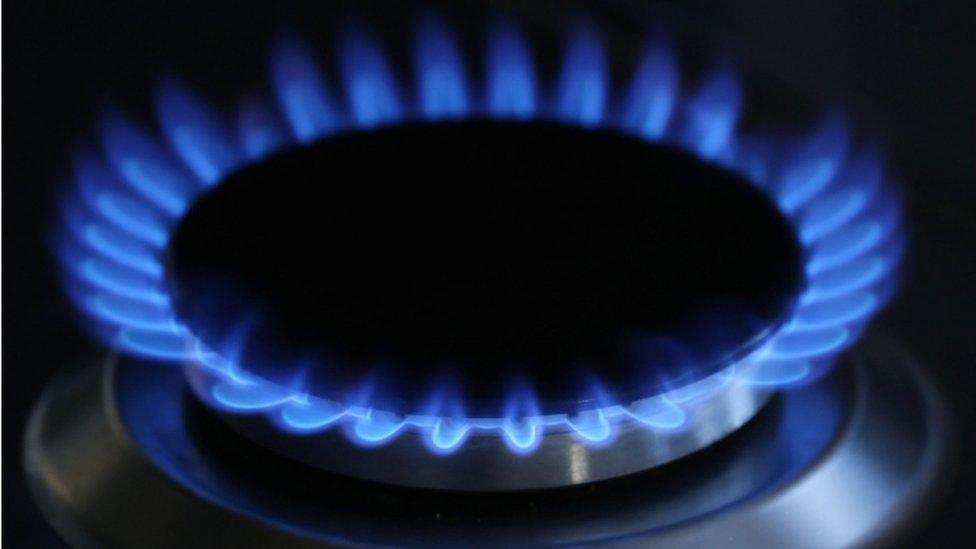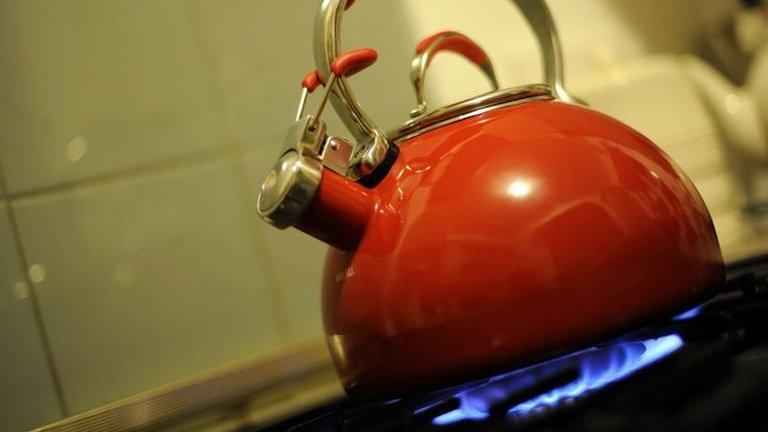Energy prices could be capped this winter, suggests minister
- Published
- comments

A gas and electricity price cap could be imposed as early as this winter, Energy Minister Greg Clark has said.
He told the BBC that the regulator, Ofgem, would receive legal backing from parliament to introduce a cap.
Asked if this could mean action this winter, he replied: "Precisely. That's exactly why I'm keen that Ofgem makes use of their powers."
But the boss of British Gas-owner Centrica, Iain Conn, warned that price caps could mean the end of cheap deals.
On Wednesday, Prime Minister Theresa May revived plans to cap prices, something that was promised in the Conservative's election manifesto but was absent from June's Queen's Speech.
Her statement was followed by sharp falls in energy company share prices. But Thursday trading saw a partial recovery, with most up by 1% or more.
Mr Clark told the BBC's Today programme: "If they [Ofgem] need legal back-up there is a strong consensus in parliament for this, so we will publish legislation and we'll invite the whole House to endorse this so that they have the legal certainty."
The full details will be published in a draft Parliamentary bill next week.
Flatter prices
Some 12 million people are on energy companies' Standard Variable Tariffs (SVTs). These tariffs are typically the most expensive.
SVTs are already falling from favour with energy suppliers. E.On has said it will phase out standard variable tariffs from next year and Centrica's Iain Conn agreed they should be abolished.
The Competition and Markets Authority has said consumers have been collectively overcharged £1.4bn by energy providers, a figure disputed by Mr Conn, who said the figure was equivalent to the industry's entire profit so it was not possible for companies to have overcharged by such a sum.
Mr Conn also argued the price cap plan would not be best for consumers, as there was "clear evidence" they did not work.
He told the BBC: "In New Zealand, in Spain, in California and in Ontario they tend to limit choice, reduce competition and prices tend to bunch around the cap."
This had also been noticeable in this country, he said: "We've seen this this year in the UK with the new pre-payment meter cap where most prices are within £2 of each other."
Mr Conn accepted the market needed to change, and acknowledged the industry itself should accept an element of blame for the way the market had evolved.
Many in the industry were critical of Theresa May's announcement on Wednesday, arguing that a price cap risked stifling competition.
"Over three million consumers have switched already this year and the number of standard tariffs have fallen by almost a million in the last six months," said Lawrence Slade, Energy UK chief executive.

Analysis: Simon Gompertz, personal finance correspondent:
First the Prime Minister says there will be a draft bill for an energy price cap. Then we hear that if Ofgem comes up with a cap quickly, time-consuming legislation won't be needed.
In fact, Greg Clark suggests the protection could be in place before this winter's heating bills start racking up.
The problem, though, is that Ofgem has long taken the view that, on its own, it cannot impose a full cap because suppliers will appeal against it and probably win.
Mr Clark may be hoping that Ofgem will act promptly regardless of that danger, encouraged by the government standing behind it with a big stick.
Another possibility is a two-stage process.
The regulator brings in a more limited cap it is working on for several million low income families on Standard Variable Tariffs. That could happen before Christmas.
Then next year sees the introduction of a legal cap for all 12 million on standard rates.

The boss of a fuel poverty charity told the BBC that a broad energy price cap would not help vulnerable consumers.
Jenny Saunders, chief executive of National Energy Action, told the BBC's Wake up to Money Podcast: "We've been advocating a rather more focused cap, not a general cap on all standard variable rate customers because we recognise there are particular problems for very vulnerable households - people on the lowest incomes.
"We're not advocating a full cap across the board, target it to those who need it, people who are rationing their energy use, who are going to go cold this winter.
"The cost of doing this will be smeared right across the customer base so if we're going to reduce the cost across the board for standard variable tariffs it will go up for other customers who are on fixed-rate tariffs, and we've been encouraging a lot of people to go onto fixed rates."
- Published4 October 2017

- Published29 September 2017

- Published3 July 2017
